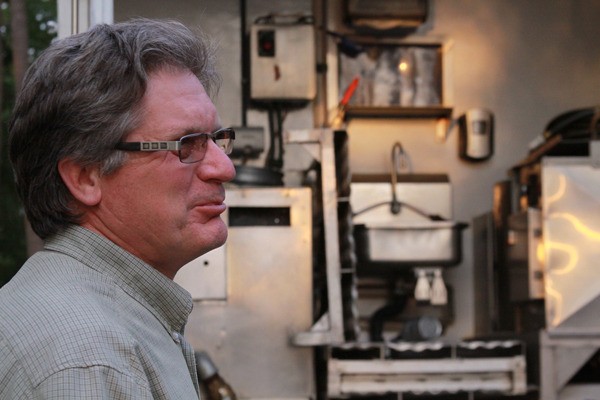The feathers that stuck to the side of a steel work platform were a clear indication that this was no ordinary semi-truck.
“It can be pretty messy,” David Bauermeister said.
Bauermeister was standing next to a chute near the rear of a trailer unit where chicken feathers tend to fly when business is good.
He was showing off the Northwest Agriculture Business Center’s latest bit of innovation on wheels, the Mobile Poultry Processing Unit. As the NABC’s executive director, Bauermeister got to play the dual role of guest speaker at a recent Whidbey Island Farm Forum in Coupeville and truck driver from the unit’s resting place in Burlington.
 It was the first time he’d taken the rig to Whidbey and is hopeful it won’t be the last.
It was the first time he’d taken the rig to Whidbey and is hopeful it won’t be the last.
“It’s a good fit for Whidbey Island,” Bauermeister said.
Several speakers came to share information at Nordic Hall, but it was clear that many of the roughly 30 attendees, some aspiring poultry farmers, were most eager to hear what Bauermeister’s unit was all about.
Poultry farming was once a major enterprise on Whidbey with hundreds of thousands of turkeys and chickens roaming farmlands.
Meeting the demands of a growing local food movement makes the idea enticing again, particularly with a mobile unit that will pull up to one’s farm and process the poultry for the farmer, requiring only potable water and electricity.
“I think it’s all related to people wanting to get closer to the source of their food,” said Karen Bishop, a Coupeville farmer who also is district manager of the Whidbey Island Conservation District, which sponsored the forum.
“You could push back against more of a commercial model. It’s also something they just want to do.”
The mobile poultry processing unit has been in operation in three northwest Washington counties for nearly a year, has a reservation for work in San Juan County and is looking to add Whidbey.
The unit was funded by a grant through the Whatcom County Foundation’s Sustainable Whatcom Fund. The program is designed to help producers by taking specific processing regulations that must be followed and stringent guidelines for facilities used out of their hands. For paid NABC members, the cost to process each whole chicken is $4 with a minimum service call charge of $400 per day.
Chickens, turkeys, waterfowl and game birds can all be processed through the unit.
Although it’s a messy process, Bauermeister said it’s sterile, convenient and relatively fast.
The unit is WSDA certified and involves a staff member in three different compartments. The first compartment is a kill unit where the chicken is bled out first, then scalded, plucked and fed through a chute into a cleaning room.
After the internal organs are removed, the chicken is cleaned, chilled and then sent to packaging through another chute. The whole chicken comes out packaged, labeled and ready for pickup near the front end of the unit in a matter of a couple hours.
Michael Nehring, an aspiring poultry farmer from Langley, liked Bauermeister’s presentation and truck tour.
“I hand plucked a few chickens once,” he said. “It was as hard as my grandmother described it would be.”
For information about the mobile poultry processing unit, call 360-336-3727 or email info@agbiz center.org.


